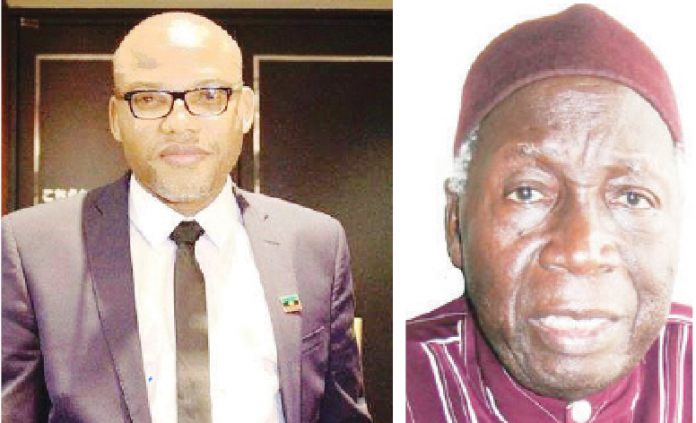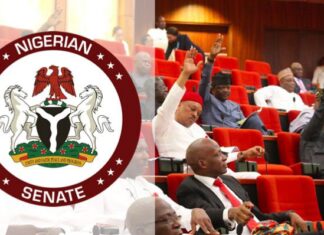Special Correspondent, OKEY MADUFORO, looks at the various dimensions of Biafra self-actualisation struggle and stumbling blocks.
On Tuesday, August 2003, Nigeria literally stood still. Economic and commercial activities were grounded following a directive by the Movement for the Actualisation of the Sovereign State of Biafra (MASSOB) on the Igbo of the defunct Republic of Biafra to sit at home in a bid to make a statement on the battle to emancipate themselves from the Nigerian state.
This order and consequent adherence sent jitters across the country, especially as it appeared a huge threat to the unity, indivisibility and corporate existence of the nation.
The then President Olusegun Obasanjo was hardly amused at the frightening development but laboured to downplay the significance of the situation.
MASSOB leads the struggle
That first salvo by MASSOB, somehow, became the take-off point for contemporary South East self-actualisation in the face of contradictions in Nigeria since the collapse of earlier efforts in the events that culminated in the 1967-1970 civil war.
Those who never took the action serious later came to terms with the stack realities of what Ndigbo actually wanted in the Nigerian polity.
Ever since, the battle had remained constant and the impressions it made on other Nigerians have been deep and undiluted.
The emergence of Ralph Uwazuruike, the MASSOB leader, to firm through the struggle almost succeeded in selling the impression of arrival of yet another leader for Biafra emancipation at a time Dim Chukwuemeka Odumegwu Ojukwu (of blessed memory) had retired from active engagements.
What particularly gave weight to the optimism was that Uwazuruike’s emergence coincided with time the late Biafran leader had openly confessed his frustration in not having a strong character to take over from him. Ojukwu was quoted as saying: “I have been running a relay race and when I looked up in search of whom I will hand over the baton, I saw nobody.” This solemn lamentation by the stoic Ikemba readily threw up the MASSOB leader as the arrowhead of the renewed Igbo self-actualisation agenda.
Incidentally, Uwazuruike, earlier in the course of the struggle, cut the picture of the late Indian freedom fighter, Mahatma Gandhi, who secured independence for his people without firing a shot.
That image also fitted into the MASSOB strategy of remaining non-violent in carrying out its activities even in the face of provocations by overzealous security operatives who had on some occasions misinterpreted the group’s agenda.
Uwazuruike loses steam
Unfortunately, the initial mass appeal ignited by the Uwazuruike leadership nose-dived when he openly declared support for the second term ambition of former President Goodluck Jonathan. The unprincipled action which critics alleged came with pecuniary targets clearly ran against his claim of leading an agitation for a separate country from Nigeria.
The volte-face by the MASSOB leader had a backlash on his person and followership. He has ever since maintained a silhouette of his hitherto soaring profile, making occasional incursions on national issues in manners that lack concrete force.
MASSOB splits
Uwazuruike’s perfidy did not go unnoticed by other senior members of MASSOB, who initiated actions against him. Uchenna Madu, the Director of Information of the organisation, fired the first shot on the alleged betrayal when he accused Uwazuruike of sell-out and compromising the wishes and aspiration of Ndigbo.
Madu, who spoke with TheNiche, said: “It is important to note that our petitions are with the United Nations. We, in the same petition, passed a vote of no confidence on our defected leader, Chief Ralph Uwazuruike, due to his shameless positions on our struggle for total emancipation.”
He alleged that Uwazuruike had deviated from the Biafra struggle “which was evidently shown in his meeting with (Hamza) Al Mustapha, Asari Dokubo, Frederick Fasheun of Oodua Peoples Congress (OPC), Shettima Yerima of Arewa Youths Congress” in his Owerri home in September 2013, which resulted in his campaign for Jonathan’s election. The alleged Owerri meeting, Madu continued, resulted in some elements in MASSOB sympathetic to Uwazuruike protest against the then Chairman of Independent National Electoral Commission (INEC), Prof. Attahiru Jega.
Madu hinted on MASSOB holding a general election to enthrone a new leader as replacement for Uwazuruike, who he described as history in the face of the confusing circumstances.
Uwazuruike, however, fired back and suspended Madu in a power game that saw MASSOB split into two camps.
Enter Biafra Zionist Movement
It was, apparently, the sudden loss of face and relevance by MASSOB that led to the rise of a group that its members described themselves as the Biafra Zionists. Not many initially reckoned with the emergence of the group until the members allegedly attempted to take over the Federal Radio Corporation of Nigeria (FRCN), Enugu, in a plot to announce the Biafra Republic, recently.
That obviously misguided effort virtually pronounced the movement dead on arrival, as the facilitators and their foot soldiers were promptly arrested.
IPOB takes the gauntlet
At some point, it all appeared that the battle for the actualisation of a Biafran state had failed.
But former President-General of Ohanaeze Ndigbo and consultant surgeon, Dozie Ikedife; former Enugu State Chief Judge, Justice Eze Ozobu (rtd.); veteran Biafran Commander, Col. Joe Achuzia; and Emeka Adolf Chigozie Emakesiri recently opened a new chapter in the history of Biafran agitation.
These new gladiators in the Biafra project took up the agenda on the platform of the Indigenous People of Biafra (IPOB) and headed for the United Nations (UN) to make presentations.
The body had earlier filed a case at the Federal High Court, Owerri, Imo State, in suit No FHC/OW/CS/192/2013 demanding a government of Indigenous People of Biafra.
In going about the project, Ikedife announced that the era of protest and demonstrations were over, adding that the Biafra agitators can only have teeth if the people operate within the ambits of law.
While IPOB made its point of departure from the established trend, the propaganda machine of the body fired by Nnamdi Kanu disagreed and carried on with its strategy, using the instrumentality of Radio Biafra. He had been on the exercise until he was taken in by operatives of the Department of State Security (DSS) last month.
Kanu’s arrest and mass protest
In the last one week, the five states of the South East zone, including Delta, Cross River and River states, have been on the edge following the mass protests across the entire area that the protesters insist constitute the Bight of Biafra.
Major cities and towns in the areas have been shut down by the protesters whose intimidating crowd almost overwhelmed security operatives. Our reporter gathered that the protest was not unconnected with the arrest of Kanu.
South East leaders disown Kanu
South East Governors’ Forum (SEGF) led by Rochas Okorocha of Imo is clearly not amused at the turn of events. Okorocha was, last week, reported to have convened a meeting of the body in Owerri, the state capital, to wade into the issue. By Wednesday, however, it was not certain if he had been able to convince his colleagues on the venue for the parley. Other governors, it was learnt, had insisted on the meeting taking place in Enugu, the South East political capital. Notwithstanding, Okorocha has condemned the protest by IPOB agitators, stressing that it was not in the interest of the region.
IPOB Supreme Council of Elders has also washed its hands of Kanu’s strategies, that the young man has been expelled from the body.
Ikedife, a member of the body, told TheNiche that though Kalu was a member at the inception of the body, he had since been expelled from the organisation, following his lack of decorum in the manner he is carrying out his campaigns on air.
“He was with us before he went astray. Kanu went and registered IPOB Limited, and we are asking: Is this business enterprise? Who are the shareholders? He has been fighting us ever since then. This is a man who said he would eliminate me and my family as well as relatives of members of the council,” Ikedife stated.
He added that Kanu’s use of inciting and abusive languages is unacceptable to the IPOB, that he had been using the name of the organisation wrongly. “When you listen to his belligerent and provocative language, you will agree with me that this is unbecoming and is against what we stand for.”
Madu however disagreed, condemning, rather, the arrest of Kanu and other IPOB members.
“We condemn the cowardly arrest, but also accept the fact that it is part of non-violent struggle. No agitation is complete without arrest, detention and prosecution. It shapes the minds of the activists drawing sympathy from the internal and external observers.
“It also shows that Biafra agitation has become a factor of reckoning in Nigeria. These series of arrests will cause more diplomatic harm on Nigeria’s image than good. We demand their immediate release,” he said.
Ohanaeze keeps mum
Curiously, in the midst of the confusion, Ohanaeze, the apex Igbo socio-cultural organisation, has maintained a deafening silence, neither condemning nor endorsing Kanu’s arrest and corresponding protest.
Similarly, National Assembly members of Igbo extraction have adopted tactical silence on the development, apparently for fear of being branded rebels by the Nigerian government.
Critics, however, argue that their stance contrasts with that of their counterparts in other parts of the country whose zones had encountered similar struggles as IPOB in the past. They cited instances in the North and in South West where the political elite, rather than chastise their people, urged the government to see reasons in the agitation by Boko Haram, OPC and Arewa Peoples Congress (APC).
A chieftain of Anambra State chapter of All Progressives Congress (APC), who asked not to be mentioned, described the docile stance of the Igbo elite in the prevailing circumstances as playing the ostrich. “It is indeed obvious that Igbo leaders are playing the ostrich by grumbling silently over the fate of their people in the country’s configuration and at the same time branding the protesters miscreants, in their bid to retain their privileges and positions in the polity,” he lamented.
This lukewarm attitude is what analysts see as the greatest impediment in actualising the Biafra self-determination struggle.
Learning from Scotland
Ikedife, who studied in Glasgow, Scotland, seems to appreciate a better way forward, citing the self-determination strategy in Scotland.
“They went on to conduct a referendum which was lost by 45 to 55 per cent. No gun was fired, no baton was used, and no verbal insult or speeches on ethnic hatred. This agitation for independence of Biafra is a serious thing to look at with compassion,” he suggested.
This seems to be in line with the intellectual approach that informed commentators on the IPOB agitation recommend.











